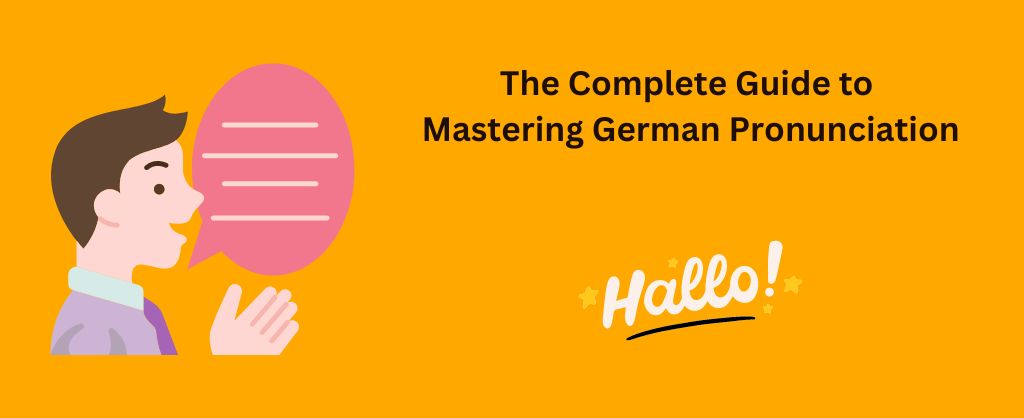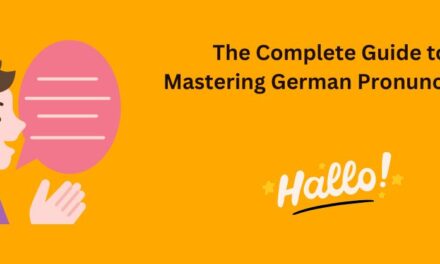The Complete Guide to Mastering German Pronunciation

Learning proper German pronunciation may seem intimidating at first. With unfamiliar sounds, long words, and various regional accents, getting your mouth around the German language takes dedication and practice.
However, developing good pronunciation habits early in your learning journey will pay dividends as you progress.
This comprehensive guide covers everything you need to know about German sounds, spelling rules, patterns, and techniques to master pronunciation like a native speaker.
Topics Covered in This Article
- Introduction to German Pronunciation
- Why Proper Pronunciation is Important in German
- Mastering German Sounds
- Helpful Tips for German Pronunciation
- Common German Spelling and Pronunciation Patterns
- Immersive Pronunciation Practice Methods
- Exploring the Diversity of German Dialects
- Conclusion
30+ Common German Idioms and How to Use Them
Introduction to German Pronunciation
Before diving into the intricacies of pronunciation, it’s helpful to have a high-level understanding of German phonetics.
Here’s a quick overview:
- German uses the Latin alphabet with some additional characters like Ä, Ö, Ü, and ß.
- It is mostly phonetic – words are pronounced as they are spelled.
- Vowel length distinguishes word meaning. For example, ‘bitten’ (to ask) versus ‘bitten’ (to bite).
- Stress is usually on the first syllable of a word. This gives German its characteristic rhythm.
Now let’s explore the ins and outs of pronouncing consonants, vowels, diphthongs, and tricks like the notorious ‘ch’ sound in detail. But first, let’s discuss why correct pronunciation matters.
Why Proper Pronunciation is Important in German
Some learners downplay the importance of pronunciation, but it is essential for effective communication.
Here are three key reasons to prioritize improving pronunciation:
1. Enables Understanding
Proper pronunciation enables you and native German speakers to understand each other. Even small errors can muddle meaning.
For example, ‘Hut’ (hat) versus ‘Hut’ (guard) differ only in vowel length. Mastering sounds allows fluid, enjoyable conversation.
2. Allows Expression
Butchered pronunciation hampers your ability to express thoughts and ideas. By pronouncing words clearly and accurately, you can say what you mean without frustration on either end.
Proper pronunciation is freeing, not constricting.
3. Makes a Good Impression
Pronunciation shows respect for the language and native speakers. They appreciate learners who pronounce words properly and are more likely to converse with you.
Good pronunciation makes you stand out immediately.
Now that you’re motivated to improve, let’s get into the fundamentals and master the sounds!
Mastering German Sounds
German Consonants
German consonants generally follow English pronunciations but have a few key distinctions to be aware of:
- Plosives: P, T, K: Plosives at the start of words are aspirated. Say ‘Table’ with a puff of air.
- B, D, G: Softer, non-aspirated plosives. Tongue rests behind teeth for ‘D’ in ‘denken’.
- S, Z: English-like ‘s’ is pronounced using the tip of the tongue on bottom teeth. Buzzing ‘z’ as in ‘Zeit’.
- W: Formed with puckered lips. Found at the start of words like ‘wasser’.
- L: Dark ‘l’ using the back of the tongue. In words like ‘lang’.
- R: Rolled or trilled ‘r’. Should vibrate in the mouth. As in ‘Reise’.
- Ch: Unique German ‘ch’ sound. Make an ‘ich’ or ‘ach’ noise. More below!
Drill words with these consonants in all positions to get comfortable. Record yourself and compare to native audio.
German Vowels
German vowels have some key distinctions from English to be aware of:
- Length: Listen for short vs long vowels. ‘Bitte’ uses a short vowel while ‘Beet’ has a long vowel sound. Subtle but changes meaning.
- Umlauts Ä, Ö, Ü: Ä is an ‘Eh’ sound. Purse lips for Ö and Ü. No direct English equivalent.
- I vs E: More differentiation than English. ‘Bitte’ is a closed ‘i’ sound. ‘Beten’ is a broad ‘e’.
- Diphthongs: Combinations like ‘ei’, ‘au’, ‘eu’. Glide between the vowels smoothly.
Isolate and practice vowels conscientiously. Mimic native audio recordings. Vowel mastery is crucial.
Conquering the Infamous German ‘Ch’
Here are tips for pronouncing the notoriously difficult German ‘ch’ sound:
- Round lips into an ‘O’ shape when making the sound.
- Exhale air through the narrow lip opening steadily.
- Allow your tongue to rest behind bottom teeth.
- Start slowly with words like ‘ich’ and ‘auch’. Increase speed with practice.
- Imagine gargling water – it’s similar to the ‘ch’ sensation.
The ‘ch’ appears in common words like ‘danke’, ‘richtig’, and ‘drei’. Use audio samples like Scottish ‘loch’ as reference.
Helpful Tips for German Pronunciation
Beyond studying individual letters, several best practices boost pronunciation skills:
- Imitate audio recordings of native German speakers. Mimic the natural rhythms.
- Sing along with German music or rhymes. Connect sounds and melody.
- Read German books, poems or newspapers aloud. Link writing to phonetic speaking.
- Use rhymes, alliterations or tongue twisters. Playfully push your abilities.
- Note regional accents. While standard German is universal, dialects have unique features.
- Break words into syllables when struggling. Tackle each sound group separately.
With immersive listening and regular speaking practice using these tips, German sounds will become second nature.
Achieving an Authentic German Accent
You’ve built solid phonetic fundamentals – now let’s elevate your accent:
- Analyze speech melody and sentence rhythms
- Stress proper syllables based on part of speech
- Record yourself speaking and compare
- Practice with tongue twisters like “Fischers Fritze fischt frische Fische”
- Read phonetic poetry known as ‘sprechgesang’
- Use mirroring and repetition exercises
- Make mistakes! It’s part of the learning process
- Consider a language tandem partner for live practice
With diligent listening and daily spoken practice, your pronunciation will quickly sound natural to native ears!
Tips for Mastering German City Names
Pronouncing German city names clearly is important for conversing and traveling. Some pointers:
- Stress syllables properly – first syllable nearly always stressed
- Enunciate vowels purely – avoid ‘mumbling’
- Link combinations like ‘sch’ smoothly
- Break cities into smaller words – ‘Hannover’, ‘Düsseldorf’
- Listen often to native speakers saying city names
With practice, you can learn to pronounce ‘Donaueschingen’ and ‘Baden-Baden’ like a local!
Strategies for Pronouncing Long German Words
German compound words can seem intimidating. But several tactics make them manageable:
- Break words into individual components
Ex. Geschwindigkeitsbeschränkung = Geschwindigkeit + Beschränkung
- Learn prefixes, suffixes, and root words
Ex. Geburtstag, Fahrvergnügen, Lebensmittel
- Accent the first syllable
Ex. Überraschung, Versicherung
- Read compound words slowly at first
- Use cognates as pronunciation clues
Ex. Organisation, International, Digitalisierung
Compounds break down into comprehensible chunks. Studying word components unlocks pronunciation and vocabulary expansion.
Tips for Mastering German Numbers
German numbers follow predictable patterns but require practice to pronounce properly:
- Stress first syllable as usual
Ex. SIEBzig, VIERundzwanzig
- Link words smoothly in long numbers
Ex. EinhundertACHTundzwanzig
- For teens, focus on ‘-zehn’ ending
Ex. zwölf, achtZEHN, neunZEHN
- Use audio examples and recordings
- Learn number vocabulary comprehensively
Ex. eins, drei, fünf, zehn, zwanzig, hundert, tausend
With regular spoken practice using native audio, German numbers will roll off your tongue!
Strategies for Pronouncing Letter Combinations
German letter combinations create unique sounds to educate your ear and tongue to:
Tsch
- Found in words like ‘Deutsch’ and ‘Tschüss’
- Same sound as English ‘ch’ in ‘chess’
Sch
- The famous German ‘sh’ sound
- Starts words like ‘sprechen’ and ‘Schule’
Ch
- Trickier than ‘tsch’ or ‘sch’
- Make a cat hissing sound without anger
- Appears in ‘ich’, ‘China’, ‘Chemie’
Sp, St
- ‘Sp’ gives ‘shp’ sound, ‘st’ gives ‘sht’
- Only at beginning of syllables
Eu, Ei
- ‘Eu’ makes an ‘oy’ sound as in ‘Freude’
- ‘Ei’ makes an ‘eye’ sound as in ‘eine’
Isolate combinations and practice regularly. Mimic audio, get feedback, and record yourself. Consistent effort conquers combinations.
Techniques for Memorizing Proper Pronunciation
Here are some top tips for committing proper German pronunciation to memory:
- Use mnemonics and associations
Ex. Achtung sounds like ‘ahtung’ for attention
- Apply colorful imagery
Ex. Visualizing a frowning ‘Ü’ helps form the lips correctly
- Create rhymes or songs
Ex. “Deutsch mit mich, sprechen Sie.”
- Relate words to cognates
Ex. Milch sounds like ‘milk’ without the ‘i’
- Write out phonetic spellings
- Attach extra meaning to challenging words
Ex. “Ich” sounds like an “itch” you want to scratch
Leverage these memorization aids and find combinations that work for you. Making associations, images, and patterns cements proper pronunciation.
Common German Spelling and Pronunciation Patterns
Recognizing recurring spelling and sound patterns speeds up phonetic fluency. Here are some examples:
Consonant Clusters
- Common beginnings like ‘spr’, ‘str’, ‘schw’, ‘schr’, ‘dr’.
- Endings like ‘rst’, ‘cht’, ‘mpf’, ‘ngst’.
Prefixes and Suffixes
- ge-, ver-, zer-, ent- / -ung, -heit, -keit, -ion, -chen
Cognates
- Shared words like Regal, Elefant, System
Loanwords
- Latin/Greek loans follow German rules: Photo, Text, Baby
Capitalized Nouns
- Capital letter aids pronunciation based on sentence position
Look for these types of patterns when deciphering longer German words and phrases. Breaking them down makes pronunciation more intuitive.
Immersive Pronunciation Practice Methods
Here are some top techniques for practicing German pronunciation immersively:
Shadow Speaking
Repeat native audio immediately after hearing it, from single words to dialogues. Mirror rhythm, speed, and inflection. Excellent ear training!
Listen to Audiobooks
Let audiobooks in German wash over you in the car or while exercising. Absorb vocabulary, grammar, cadence, accent, and more.
Sing Along with Music
Pick fun, lyrical German songs and sing loudly and proudly! Music embeds pronunciation patterns in your brain.
Dialogue Exchanges
Practice conversations out loud taking on each role. Swap faster and faster to build fluidity. For extra challenge, record and listen back.
Mimic Movie Scenes
Watch German films and dramas and repeat lines aloud with matching emotion and delivery. Feel the language come alive!
Give Voice Commands
Issue commands and requests out loud to smart devices, pets, or chatbots. Speak conversationally and get used to pronouncing phrases.
Record a Journal
Describe your day, thoughts, or stories in a verbal journal. Listen back and note where your pronunciation needs work.
The more chances you take to speak German out loud with abandon, the quicker your pronunciation skills will improve!
Using Feedback and Self-Analysis
Improving your pronunciation requires getting objective feedback. Here are productive ways to do so:
- Ask native speakers for feedback on tricky words
- Use online tutors to identify pronunciation issues
- Share recordings online and request critiques
- Compare your speech samples to native ones
- Note words others misunderstand
- Mark problem letter combinations for focused practice
Be positively motivated by feedback. Each correction brings you one step closer to mastery. Analyzing and self-critiquing also develops your linguistic awareness.
Optimizing Your Language Learning Environment
Creating an environment optimized for practicing German pronunciation will accelerate your progress:
- Surround yourself with native speaking audio
- Adorn your space with German alphabet charts and phonics diagrams
- Ensure recording capability to analyze speech samples
- Display German poetry, sayings, and tongue twisters
- Play language learning games to reinforce sounds
- Join local German conversation meet-ups
- Organize regular tandem conversations online
When your space supports your goals visually and aurally, you program your brain for phonetic success.
Exploring the Diversity of German Dialects
While standard German (Hochdeutsch) is universally understood, Germany has a rich tapestry of regional dialects:
Bavarian
- Thick southern accent of Munich and surrounding Bavaria
- ‘Mein’ becomes ‘moi’, ‘wir’ becomes ‘mia’
Swabian
- Baden-Württemberg dialect using unique ‘sch’ sounds
- Replaces ‘ß’ with ‘sch’ – ‘Spaß’ is ‘Schbass’
Saxon
- Eastern German accent of cities like Dresden and Leipzig
- Flatter, more staccato rhythm
Berlinerisch
- Urban working-class dialect of Germany’s capital
- Known for contractions – ‘Ich bin’ becomes ‘Ick bin’
Kölsch
- Local speech of Cologne region
- Very sing-song, rising and falling cadence
Swiss German
- Radically different vocabulary and consonants
- Difficult even for standard German speakers!
Low German
- Northern coastal dialects near Netherlands
- Influenced by Dutch and Scandinavian languages
Listen to audio examples of dialects and imitate features like vocabulary and sound changes. But focus first on standard German foundations.
Conclusion
This comprehensive guide illuminates everything from umlauts to diphthongs, regional dialects to consonant clusters in German pronunciation.
While excellence requires dedication through constant listening, repetition, recording, and reading out loud, the payoff is immense.
With an attentive ear and consistent practice, you’ll be rhetorically rolling R’s and conquering those ‘ch’ sounds like a native in no time on your exciting German learning journey!









